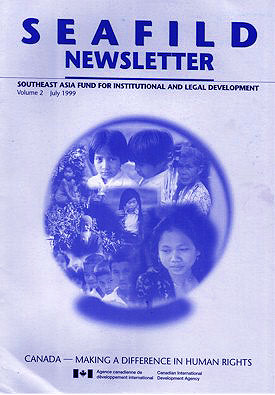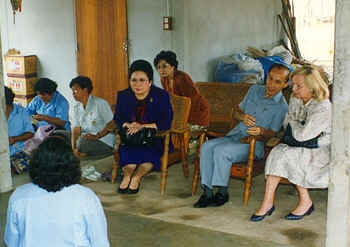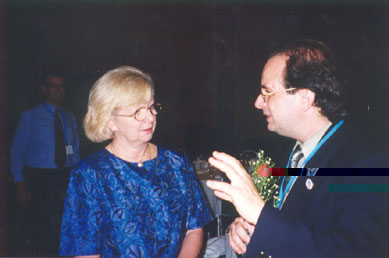SEAFILD - WORKING FOR DEMOCRACY
by
The Southeast Asia Fund for Institutional and Legal Development (SEAFILD) is a Canadian International Development Agency project that was established in response to a growing interest and need within South-East Asia for capacity building within institutions that were dealing with governance issues covering democratic development, human rights and other issues of legal reform.
Isabel Kelly, the program's director, fills us in: "SEAFILD was primarily developed as a regional project because it was felt that there were issues that touched on number of countries in the region. And for a variety of reasons, CIDA's programs in each country were somewhat different and we didn't have a vehicle for responding to requests that had to do with human rights and governance.
"Countries in the region were also at very different stages in their thinking about human rights and in their acceptance of human rights values as we know them in Canada. Seafild as a fund was set-up to respond partly to requests and partly to give Canada a means of joining with partners in this region who shared our values. It was not designed to impose a particular Canadian model or ideology but to support the champions in the region who were fighting within their own countries and societies for improvement in the rule of law, for development of civil society and to support changes in legislation, policy and within the legal system which would ensure "good" governance.
"It took quite a lot of time and thought to develop this as a regional project. I think the people in CIDA who developed the concept were quite prescient because they developed it as a flexible vehicle which could support activities in a individual country or activities which involved a number of countries."
The driving force behind Seafild is the Southeast Asia Regional Program within the Asia Branch of CIDA. Henri Paul Normandin, now the head of CIDA in Beijing, was the program officer at the time, and played a pivotal role in getting the project going. Eric Yendal, formerly head of CIDA for Thailand, Cambodia and Laos, and subsequently Director General for Thailand, Malaysia, Cambodia, Laos and Vietnam, was also a supporter of SEAFILD in its early stage.
Isabel with Paiboon Wattanasiratham and Dr Saisuree Chutikul.Seafild was approved in late 1995 but was actually launched in April of 1996. (Isabel has been with the program since its inception). When Seafild first started it had its office in Singapore, which is where the field office of CIDA's regional program is located. CIDA subsequently decided there were more regional organizations and there was more of a common base of interest in Thailand for a project of this nature than in Singapore, so in April of 1999 Seafild moved to Bangkok where it has more opportunity to work with other regional organizations.
"Thailand has always been seen as a leader - in a sense a crucible or laboratory - for democracy within the region," says Isabel, "and it's always been an important country for us, not only to carry out activities but as a resource to help with activities in other countries as well."
An example of a program that Seafild supports is the "Human Rights and the Involvement of the Business Communities Study" currently being carried out by a professor from Sherbrooke University in Quebec with partners in Thailand, the Philippines, Malaysia and Indonesia. Research is being conducted as to how the business communities view human rights and how the views of different religions affected business practices. The program studies Buddhism, Christianity, Islam and Confucianism, examining a businessperson's religion to see how their view of human rights affects their business practices, eventually extending into how business is done in a particular country.
Isabel with Michel Dion from the University of Sherbrooke.This program is also trying to find a way to develop business councils on human rights. It is an exploratory project on behavior. The University of Sherbrooke is partnering with academics who are part of the business community or schools of business in the countries involved. They intend in the coming months to develop business councils, which will develop and distribute information on human rights for businesses in the form of newsletters. The research phase is almost complete and Seafild expects a report, after which the project will move to the next stage which is the development of the business councils.
Another Seafild project based in Thailand with the Mekong Regional Law Center addresses the growing issue of trafficking in women and children in the Mekong sub-region.
How does Seafild help women and children that are trafficked and forced into the sex trade? "This issue now rivals the drug trade in terms of its implications," says Isabel. "It's organized crime, not penny-ante stuff. Not only do laws need to change so that these people can be treated as victims, not criminals, but protocols or agreements need to be drawn up between countries, for example between Thailand and Cambodia, Thailand and Lao PDR, Vietnam and Cambodia, and so on, so that the authorities can deal with these women in a kind and fair way.
"As it stands now, if the police intervene they often treat the victims as criminals because they are here illegally. If they send them home, the chances are that they will also be treated as criminals because they left their country of origin illegally. The Mekong Regional Law Center and its partners have been working through this project with the authorities in the various countries to try and assist them develop new laws and procedures so that immigration officials can work with immigration officials in the countries involved, police can work with police, the legal system can work with legal system etc.
"In any system, even where there is corruption, there are also good people. As a project, we really don't do anything ourselves. What we do is to support and work with the people who can make a difference. For example, in Thailand, the moving forces behind this project are Dr Saisuree Chutikul, a Thai Senator, Vitit Muntarbhorn, a law professor at Chulalongkorn University, Dr. Jingjai Hanchanlash, a businessman and former Vice-Chair of TCCC and Dr. Pisawat Sukonthapan, a law professor at Thammasat University. All of these people have a long relationship with Canada in development work in Thailand and internationally."
Isabel with Chea Vannath, NGO worker in Cambodia.
Seafild also plays a key role in bringing divergent groups together: "One of things we can do, perhaps because we are a funding vehicle of the Government of Canada, is to help bring people together on issues of mutual concern. In most countries, Canada included, government and non-governmental organizations do not communicate well, and lose the opportunity to work together for common good. Quite often you get into a `we, they' type debate between government and people in the NGO community who are trying to create change, and this can be counter-productive and even adversarial. Occasionally in our work we are fortunate to be able to bring people from different sectors together and they find common interests and ways to solve problems."
Seafild assists in the training of workers in NGOs to help them understand the field of human rights, and how human rights law and practices can be implemented to help their clients. For example, every year, it sends people to the International Human Rights Training Program in Montreal. There participants from around the world learn about basic human rights covenants and laws and how to use them to help protect the people they deal with on daily basis.
Seafild also brings people from other countries in Southeast Asia to the Forum Asia/Chulalongkorn University Human Rights Training Program in Bangkok.
Forum Asia is a consortium of regional human rights organizations, based in Bangkok, which works on the promotion and protection of human rights, and issues such as free and fair elections and democratic development.
And Seafild supports people who are enrolled in the new Masters Program in International Human Rights at Mahidol University, which focuses on the practical application of human rights legislation.
CBC reporters Rayfield Rideout and Geoffrey Turnbull at a workshop organized by SeafildThrough training and educating journalists, teachers and government officials who are working with human rights issues on a day-to-day basis at the grass roots levels, it helps to inform people what their rights are and this knowledge empowers them.
In Thailand, Seafild has been working with many of the people who have been instrumental in the development of the Thai National Human Rights Commission. It supports an organization called the Coordinating Center for Human Rights of Thailand (CCHROT) in a project, which funded a series of seminars, public meetings and training programs and which helps the people who are trying to ensure that the legislation that is developed will result in the establishment of a truly independent and functioning Human Rights Commission for Thailand.
Isabel says, "The work of the Thai champions of the new Thai constitution and human rights legislation will result in a strong independent Human Rights Commission, and individual Thai people will have access to an institution which is deliberately set-up to protect their rights."
Another project Seafild supports is one involving the Office of the Attorney General of Thailand and an organization in Canada called the International Center for Criminal Law Reform and Criminal Justice Policy. It has helped prosecutors and others in the office of the AG to develop an integrated approach to dealing with children in the criminal justice system. It deals with ways to protecting child victims and witnesses as well as child perpetrators of crime. There is a pilot project going on in Prathumthani Province right now, which involves Thammasat University Hospital, the office of the Attorney General, the Police, the Department of Social Welfare and a child rights NGO in taking an integrated approach to dealing with children in the justice system.
Isabel says that this child centered approach is imperative so that children can to be protected, not exploited, when they have already been victims of crime, particularly in cases of child abuse. Professionals who deal with children want to serve the best interests of the child, and this Thai pilot project is breaking down departmental barriers that, in the past, have stymied their efforts.
Whether its preventing the trafficking of women and children, helping children deal with the justice system, improving migrant workers' rights, disseminating legal information, examining administrative detention or establishing institutions which will provide for open, transparent, accessible and accountable government, Seafild is out there doing good work and it deserves our support.
Contact Info:
Seafild
15th Floor, Sindhorn Tower 3,
130--132 Wireless Rd, Lumpini
Pathumwan, Bangkok, Thailand, 10330
Tel: (662) 263-2114-6 /Fax: (662) 263-2117
E-mail:seafild@loxinfo.co.th
The Southeast Asia Fund for Institutional and Legal Development (SEAFILD) is a highly innovative mechanism established by the Canadian International Development Agency (CIDA) in 1996, to promote human rights, democratic development and governance (HRDDG) in Southeast Asia. HRDDG is one of the six Official Development Assistance priorities of the Government of Canada.
SEAFILD partners with governments, non-governmental organizations and regional institutions to enhance the capacity of governments and civil society to address human rights, democratic development and governance challenges in Southeast Asia.
Further information may be obtained from contacting Seafild at the numbers listed in this article.
Finis




